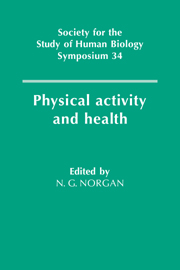Book contents
- Frontmatter
- Contents
- List of contributors
- Acknowledgements
- 1 Introduction
- 2 Comparative aspects of human activity
- 3 Physical activity levels – past and present
- 4 The validity of health measurements
- 5 Developments in the assessment of physical activity
- 6 Two national surveys of activity, fitness and health: the Allied Dunbar National Fitness survey and the Welsh Heart Health survey
- 7 Physical development and childhood activity
- 8 Physical activity and behavioural development during childhood and youth
- 9 Physiological aspects of activity and ageing
- 10 Activity and morale in later life: preliminary analysis from the Nottingham Longitudinal Study of Activity and Ageing
- 11 The benefits of low intensity exercise
- 12 Physical activity, obesity and weight maintenance
- 13 Adherence to physical activity and exercise
- 14 Women's working behaviour and maternal-child health in rural Nepal
- 15 Physical activity and psychological well-being
- 16 Leisure lifestyles: present and future
- Index
16 - Leisure lifestyles: present and future
Published online by Cambridge University Press: 05 December 2011
- Frontmatter
- Contents
- List of contributors
- Acknowledgements
- 1 Introduction
- 2 Comparative aspects of human activity
- 3 Physical activity levels – past and present
- 4 The validity of health measurements
- 5 Developments in the assessment of physical activity
- 6 Two national surveys of activity, fitness and health: the Allied Dunbar National Fitness survey and the Welsh Heart Health survey
- 7 Physical development and childhood activity
- 8 Physical activity and behavioural development during childhood and youth
- 9 Physiological aspects of activity and ageing
- 10 Activity and morale in later life: preliminary analysis from the Nottingham Longitudinal Study of Activity and Ageing
- 11 The benefits of low intensity exercise
- 12 Physical activity, obesity and weight maintenance
- 13 Adherence to physical activity and exercise
- 14 Women's working behaviour and maternal-child health in rural Nepal
- 15 Physical activity and psychological well-being
- 16 Leisure lifestyles: present and future
- Index
Summary
Leisure plays a significant role in shaping everyday lives and in defining the quality of life. This paper examines the nature and meaning of leisure, outlines recent trends and present patterns of leisure behaviour, and discusses the part played by leisure in shaping present and future lifestyles.
Definitions
Leisure and lifestyle are neither easy to define nor straightforward to measure. Definitions alone have generated a substantial literature (for example de Grazia, 1962; Brightbill, 1963; Dumazedier, 1967; Countryside Recreation Research Advisory Group, 1970; Neulinger, 1974; Kelvin, 1979; Kelly, 1982; Tokarski Filipcova & Glyptis, 1990). Leisure has been defined in three broad ways. The first relates to time. Leisure is frequently referred to as ‘the time available to the individual when the disciplines of work, sleep and other basic needs have been met’ (Countryside Recreation Research Advisory Group, 1970, p. 5). However, this notion of leisure as a mere leftover denies it any positive character or purpose. In reality, leisure is not simply time free from other things; as many unemployed people and retired people know, free time can be far from leisurely: in large quantity it can be more of a burden than a blessing.
The second approach views leisure more positively as particular types of activity, which may provide rest and recuperation, diversion, excitement, personal and social fulfilment, and, literally, mental or physical re-creation.
- Type
- Chapter
- Information
- Physical Activity and Health , pp. 230 - 245Publisher: Cambridge University PressPrint publication year: 1992
- 1
- Cited by



